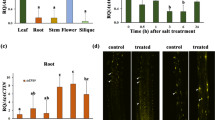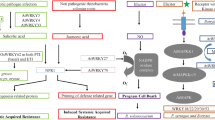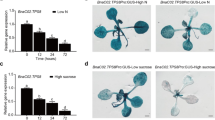Abstract
Salinity is a pivotal abiotic stress factor with far-reaching consequences on global crop growth, yield, and quality and which includes strawberries. R2R3-MYB transcription factors encompass a range of roles in plant development and responses to abiotic stress. In this study, we identified that strawberry transcription factor FaMYB63 exhibited a significant upregulation in its expression under salt stress conditions. An analysis using yeast assay demonstrated that FaMYB63 exhibited the ability to activate transcriptional activity. Compared with those in the wild-type (WT) plants, the seed germination rate, root length, contents of chlorophyll and proline, and antioxidant activities (SOD, CAT, and POD) were significantly higher in FaMYB63-overexpressing Arabidopsis plants exposed to salt stress. Conversely, the levels of malondialdehyde (MDA) were considerably lower. Additionally, the FaMYB63-overexpressed Arabidopsis plants displayed a substantially improved capacity to scavenge active oxygen. Furthermore, the activation of stress-related genes by FaMYB63 bolstered the tolerance of transgenic Arabidopsis to salt stress. It was also established that FaMYB63 binds directly to the promoter of the salt overly sensitive gene SOS1, thereby activating its expression. These findings identified FaMYB63 as a possible and important regulator of salt stress tolerance in strawberries.
Key message
FaMYB63 overexpression in Arabidopsis increases survival rate under salt stress. FaMYB63 enhances salt tolerance by ROS clearance, balance of osmotic adjustment, and the regulation of stress-responsive genes expression.









Similar content being viewed by others
Data availability
Data will be made available on request.
References
Ali A, Raddatz N, Pardo JM, Yun DJ (2021) HKT sodium and potassium transporters in Arabidopsis thaliana and related halophyte species. Physiol Plant 171(4):546–558. https://doi.org/10.1111/ppl.13166
Ali A, Petrov V, Yun DJ, Gechev T (2023) Revisiting plant salt tolerance: novel components of the SOS pathway. Trends Plant Sci 28(9):1060–1069. https://doi.org/10.1016/j.tplants.2023.04.003
Ambawat S, Sharma P, Yadav NR, Yadav RC (2013) MYB transcription factor genes as regulators for plant responses: an overview. Physiol Mol Biol Plants 19(3):307–321. https://doi.org/10.1007/s12298-013-0179-1
Arciniegas Vega JP, Melino VJ (2022) Uncovering natural genetic variants of the SOS pathway to improve salinity tolerance in maize. New Phytol 236(2):313–315. https://doi.org/10.1111/nph.18422
Blumwald E (2000) Sodium transport and salt tolerance in plants. Curr Opin Cell Biol 12:431–434. https://doi.org/10.1016/s0955-0674(00)00112-5
Cao ZH, Zhang SZ, Wang RK, Zhang RF, Hao YJ (2013) Genome wide analysis of the apple MYB transcription factor family allows the identification of MdoMYB121 gene confering abiotic stress tolerance in plants. PLoS ONE 8(7):e69955. https://doi.org/10.1371/journal.pone.0069955
Cheeseman JM (2015) The evolution of halophytes, glycophytes and crops, and its implications for food security under saline conditions. New Phytol 206(2):557–570. https://doi.org/10.1111/nph.13217
Chen KQ, Song MR, Guo YN, Liu LF, Xue H, Dai HY, Zhang ZH (2019) MdMYB46 could enhance salt and osmotic stress tolerance in apple by directly activating stress-responsive signals. Plant Biotechnol J 17(12):2341–2355. https://doi.org/10.1111/pbi.13151
Cheng LQ, Li XX, Huang X, Ma T, Liang Y, Ma XY, Peng XJ, Jia JT, Chen SY, Chen Y, Deng B, Liu GS (2013) Overexpression of sheepgrass R1-MYB transcription factor LcMYB1 confers salt tolerance in transgenic Arabidopsis. Plant Physiol Biochem 70:252–260. https://doi.org/10.1016/j.plaphy.2013.05.025
Choudhury FK, Rivero RM, Blumwald E, Mittler R (2017) Reactive oxygen species, abiotic stress and stress combination. Plant J 90(5):856–867. https://doi.org/10.1111/tpj.13299
Clough SJ, Bent AF (1998) Floral dip: a simplified method for Agrobacterium-mediated transformation of Arabidopsis thaliana. Plant J 16(6):735–743. https://doi.org/10.1046/j.1365-313x.1998.00343.x
Cui MH, Yoo KS, Hyoung S, Nguyen HT, Kim YY, Kim HJ, Ok SH, Yoo SD, Shin JS (2013) An Arabidopsis R2R3-MYB transcription factor, AtMYB20, negatively regulates type 2C serine/threonine protein phosphatases to enhance salt tolerance. FEBS Lett 587(12):1773–1778. https://doi.org/10.1016/j.febslet.2013.04.028
Daudi A, O’Brien JA (2012) Detection of hydrogen peroxide by DAB staining in Arabidopsis leaves. Bio Protoc 2:e263
Du H, Yang SS, Liang Z, Feng BR, Liu L, Huang YB, Tang YX (2012) Genome-wide analysis of the MYB transcription factor superfamily in soybean. BMC Plant Biol 12:106. https://doi.org/10.1186/1471-2229-12-106
Dubos C, Stracke R, Grotewold E, Weisshaar B, Martin C, Lepiniec L (2010) MYB transcription factors in Arabidopsis. Trends Plant Sci 15(10):573–581. https://doi.org/10.1016/j.tplants.2010.06.005
Fu HQ, Yu X, Jiang YY, Wang YH, Yang YQ, Chen S, Chen Q, Guo Y (2023) SALT OVERLY SENSITIVE 1 is inhibited by clade D Protein phosphatase 2C D6 and D7 in Arabidopsis thaliana. Plant Cell 35(1):279–297. https://doi.org/10.1093/plcell/koac283
Gaweł S, Wardas M, Niedworok E, Wardas P (2004) Malondialdehyde (MDA) as a lipid peroxidation marker. Wiad Lek 57(9–10):453–455. Polish. PMID: 15765761
He YX, Yang XD, Xu C, Guo DQ, Niu L, Wang Y, Li JW, Yan F, Wang QY (2018) Overexpression of a novel transcriptional repressor GmMYB3a negatively regulates salt-alkali tolerance and stress-related genes in soybean. Biochem Biophys Res Commun 498(3):586–591. https://doi.org/10.1016/j.bbrc.2018.03.026
Jefferson RA, Kavanagh TA, Bevan MW (1987) GUS fusions: ß-glucuronidase as a sensitive and versatile gene fusion marker in higher plants. EMBO J 6(13):3901–3907. https://doi.org/10.1002/j.1460-2075.1987.tb02730.x
Jin H, Martin C (1999) Multifunctionality and diversity within the plant MYB-gene family. Plant Mol Biol 41(5):577–585. https://doi.org/10.1023/a:1006319732410
Kim JH, Nguyen NH, Jeong CY, Nguyen NT, Hong SW, Lee H (2013) Loss of the R2R3 MYB, AtMyb73, causes hyper-induction of the SOS1 and SOS3 genes in response to high salinity in Arabidopsis. J Plant Physiol 170(16):1461–1465. https://doi.org/10.1016/j.jplph.2013.05.011
Kumar D, Yusuf MA, Singh P, Sardar M, Sarin NB (2014) Histochemical detection of superoxide and H2O2 accumulation in Brassica juncea seedlings. Bio-Protoc 4:e1108
Li PL, Song AP, Gao CY, Wang LX, Wang YJ, Sun J, Jiang JF, Chen FD, Chen SM (2015) Chrysanthemum WRKY gene CmWRKY17 negatively regulates salt stress tolerance in transgenic chrysanthemum and Arabidopsis plants. Plant Cell Rep 34(8):1365–1378. https://doi.org/10.1007/s00299-015-1793-x
Li WH, Zhong JL, Zhang LH, Wang Y, Song PH, Liu WD, Li XG, Han DG (2022) Overexpression of a Fragaria vesca MYB transcription factor gene (FvMYB82) increases salt and cold tolerance in Arabidopsis thaliana. Int J Mol Sci 23(18):10538. https://doi.org/10.3390/ijms231810538
Li WH, Li P, Chen HY, Zhong JL, Liang XQ, Wei YF, Zhang LH, Wang HB, Han DG (2023) Overexpression of a Fragaria vesca 1R-MYB transcription factor gene (FvMYB114) increases salt and cold tolerance in Arabidopsis thaliana. Int J Mol Sci 24(6):5261. https://doi.org/10.3390/ijms24065261
Liu J, Ishitani M, Halfter U, Kim CS, Zhu JK (2000) The Arabidopsis thaliana SOS2 gene encodes a protein kinase that is required for salt tolerance. PNAS 97(7):3730–3734. https://doi.org/10.1073/pnas.97.7.3730
Lu KK, Song RF, Guo JX, Zhang Y, Zuo JX, Chen HH, Liao CY, Hu XY, Ren F, Lu YT, Liu WC (2023) CycC1;1-WRKY75 complex-mediated transcriptional regulation of SOS1 controls salt stress tolerance in Arabidopsis. Plant Cell 35(7):2570–2591. https://doi.org/10.1093/plcell/koad105
Ondrasek G, Rengel Z, Maurović N, Kondres N, Filipović V, Savić R, Blagojević B, Tanaskovik V, Gergichevich CM, Romić D (2021) Growth and element uptake by salt-sensitive crops under combined NaCl and Cd stresses. Plants 10(6):1202. https://doi.org/10.3390/plants10061202
Riechmann JL, Heard J, Martin G, Reuber L, Jiang CZ, Keddie J, Adam L, Pineda O, Ratcliffe OJ, Samaha RR, Creelman R, Pilgrim M, Broun P, Zhang JZ, Ghandehari D, Sherman BK, Yu GL (2000) Arabidopsis transcription factors: genome-wide comparative analysis among eukaryotes. Science 290(5499):2105–2110. https://doi.org/10.1126/science.290.5499.2105
Saha G, Park JI, Ahmed NU, Kayum MA, Kang KK, Nou IS (2016) Characterization and expression profiling of MYB transcription factors against stresses and during male organ development in Chinese cabbage (Brassica rapa ssp. pekinensis). Plant Physiol Biochem 104:200–215. https://doi.org/10.1016/j.plaphy.2016.03.021
Shi HZ, Quintero FJ, Pardo JM, Zhu JK (2002) The putative plasma membrane Na+/H+ antiporter SOS1 controls long-distance Na+ transport in plants. Plant Cell 14(2):465–477. https://doi.org/10.1105/tpc.010371
Sun YH, Zhao J, Li XY, Li YZ (2020) E2 conjugases UBC1 and UBC2 regulate MYB42-mediated SOS pathway in response to salt stress in Arabidopsis. New Phytol 227(2):455–472. https://doi.org/10.1111/nph.16538
Wang SS, Shi MY, Zhang Y, Xie XB, Sun PP, Fang CB, Zhao J (2021) FvMYB24, a strawberry R2R3-MYB transcription factor, improved salt stress tolerance in transgenic Arabidopsis. Biochem Biophys Res Commun 569:93–99. https://doi.org/10.1016/j.bbrc.2021.06.085
Wang SS, Shi MY, Zhang Y, Pan ZF, Xie XB, Zhang LZ, Sun PP, Feng H, Xue H, Fang CB, Zhao J (2022) The R2R3-MYB transcription factor FaMYB63 participates in regulation of eugenol production in strawberry. Plant Physiol 188(4):2146–2165. https://doi.org/10.1093/plphys/kiac014
Wu X, Xu JN, Meng XN, Fang X, Xia MH, Zhang J, Cao SQ, Fan TT (2022) Linker histone variant HIS1-3 and WRKY1 oppositely regulate salt stress tolerance in Arabidopsis. Plant Physiol 189(3):1833–1847. https://doi.org/10.1093/plphys/kiac174
Xiao F, Zhou HP (2023) Plant salt response: perception, signaling, and tolerance. Front Plant Sci 13:1053699. https://doi.org/10.3389/fpls.2022.1053699
Xie XB, Li S, Zhang RF, Zhao J, Chen YC, Zhao Q, Yao YX, You CX, Zhang XS, Hao YJ (2012) The bHLH transcription factor MdbHLH3 promotes anthocyanin accumulation and fruit colouration in response to low temperature in apples. Plant Cell Environ 35(11):1884–1897. https://doi.org/10.1111/j.1365-3040.2012.02523.x
Yang YQ, Guo Y (2018) Unraveling salt stress signaling in plants. J Integr Plant Biol 60(9):796–804. https://doi.org/10.1111/jipb.12689
Yang Z, Mu Y, Wang Y, He F, Shi L, Fang Z, Zhang J, Zhang Q, Geng G, Zhang S (2022) Characterization of a novel TtLEA2 gene from tritipyrum and its transformation in wheat to enhance salt tolerance. Front Plant Sci 13:830848. https://doi.org/10.3389/fpls.2022.830848
Yoshiba Y, Kiyosue T, Katagiri T, Ueda H, Mizoguchi T, Yamaguchi-Shinozaki K, Wada K, Harada Y, Shinozaki K (1995) Correlation between the induction of a gene for Δ1-pyrroline-5-carboxylate synthetase and the accumulation of proline in Arabidopsis thaliana under osmotic stress. Plant J 7(5):751–760. https://doi.org/10.1046/j.1365-313X.1995.07050751.x
Yu LJ, Nie JN, Cao CY, Jin YK, Yan M, Wang FZ, Liu J, Xiao Y, Liang YH, Zhang WH (2010) Phosphatidic acid mediates salt stress response by regulation of MPK6 in Arabidopsis thaliana. New Phytol 188(3):762–773. https://doi.org/10.1111/j.1469-8137.2010.03422.x
Yu L, Liu WJ, Guo ZW, Li ZQ, Jiang HY, Zou Q, Mao ZL, Fang HC, Zhang ZY, Wang N, Chen XS (2020) Interaction between MdMYB63 and MdERF106 enhances salt tolerance in apple by mediating Na+/H+ transport. Plant Physiol Biochem 155:464–471. https://doi.org/10.1016/j.plaphy.2020.08.017
Zhang QY, Liu X, Yu JQ, Hu DG, Hao YJ (2016) Molecular cloning and functional characterization of MdMYB73 reveals its involvement in salt tolerance in apple callus and Arabidopsis. Acta Hortic Sin 43(11):2073–2080. https://doi.org/10.16420/j.issn.0513-353x.2016-0435
Zhang QY, Yu JQ, Wang JH, Hu DG, Hao YJ (2017) Functional characterization of MdMYB73 reveals its involvement in cold stress response in apple calli and Arabidopsis. J Integr Agric 16(10):2215–2221. https://doi.org/10.1016/S2095-3119(17)61723-4
Zhang X, Chen LC, Shi QH, Ren ZH (2020) SlMYB102, an R2R3-type MYB gene, confers salt tolerance in transgenic tomato. Plant Sci 291:110356. https://doi.org/10.1016/j.plantsci.2019.110356
Zhang H, Song J, Dong F, Li Y, Ge S, Wei B, Liu Y (2023) Multiple roles of wheat ferritin genes during stress treatment and TaFER5D-1 as a positive regulator in response to drought and salt tolerance. Plant Physiol Biochem 202:107921. https://doi.org/10.1016/j.plaphy.2023.107921
Zhao Q, Zhang H, Wang T, Chen SX, Dai SJ (2013) Proteomics-based investigation of salt-responsive mechanisms in plant roots. J Proteomics 82:230–253. https://doi.org/10.1016/j.jprot.2013.01.024
Zhao K, Cheng ZH, Guo Q, Yao WJ, Liu HJ, Zhou BR, Jiang TB (2020) Characterization of the Poplar R2R3-MYB gene family and over-expression of PsnMYB108 confers salt tolerance in transgenic tobacco. Front Plant Sci 11:571881. https://doi.org/10.3389/fpls.2020.571881
Zhao SS, Zhang QK, Liu MY, Zhou HP, Ma CL, Wang PP (2021) Regulation of plant responses to salt stress. Int J Mol Sci 22(9):4609. https://doi.org/10.3390/ijms22094609
Zhou JL, Lee CH, Zhong RQ, Ye ZH (2009) MYB58 and MYB63 are transcriptional activators of the lignin biosynthetic pathway during secondary cell wall formation in Arabidopsis. Plant Cell 21(1):248–266. https://doi.org/10.1105/tpc.108.063321
Zhu JK (2000) Genetic analysis of plant salt tolerance using Arabidopsis. Plant Physio 124(3):941–948. https://doi.org/10.1104/pp.124.3.941
Zhu JK (2001) Plant salt tolerance. Trends Plant Sci 6(2):66–71. https://doi.org/10.1016/s1360-1385(00)01838-0
Zhu JK (2002) Salt and drought stress signal transduction in plants. Annu Rev Plant Bio 53:247–273. https://doi.org/10.1146/annurev.arplant.53.091401.143329
Zhu JK (2016) Abiotic stress signaling and responses in plants. Cell 167(2):313–324. https://doi.org/10.1016/j.cell.2016.08.029
Funding
This work was supported by the Natural Science Foundation of University in Anhui Province, China (KJ2021A0184, 2022AH050931), Anhui Province Natural Science Foundation (2108085MC105), and Key R&D Program of China (2022YFD1600702).
Author information
Authors and Affiliations
Contributions
SS Wang, RY Jiang, CB Fang, and J Zhao designed the experiment. SS Wang and RY Jiang performed the experiments. J Feng, HD Zou, and XH Han participated in experiments. SS Wang and RY Jiang collected and analyzed data. CB Fang and J Zhao wrote and revised the paper. All authors have read and agreed to the published version of the manuscript.
Corresponding authors
Ethics declarations
Conflict of interest
The authors declare that they have no conflict of interest.
Additional information
Publisher's Note
Springer Nature remains neutral with regard to jurisdictional claims in published maps and institutional affiliations.
Supplementary Information
Below is the link to the electronic supplementary material.
Rights and permissions
Springer Nature or its licensor (e.g. a society or other partner) holds exclusive rights to this article under a publishing agreement with the author(s) or other rightsholder(s); author self-archiving of the accepted manuscript version of this article is solely governed by the terms of such publishing agreement and applicable law.
About this article
Cite this article
Wang, S., Jiang, R., Feng, J. et al. Overexpression of transcription factor FaMYB63 enhances salt tolerance by directly binding to the SOS1 promoter in Arabidopsis thaliana. Plant Mol Biol 114, 32 (2024). https://doi.org/10.1007/s11103-024-01431-2
Received:
Accepted:
Published:
DOI: https://doi.org/10.1007/s11103-024-01431-2




